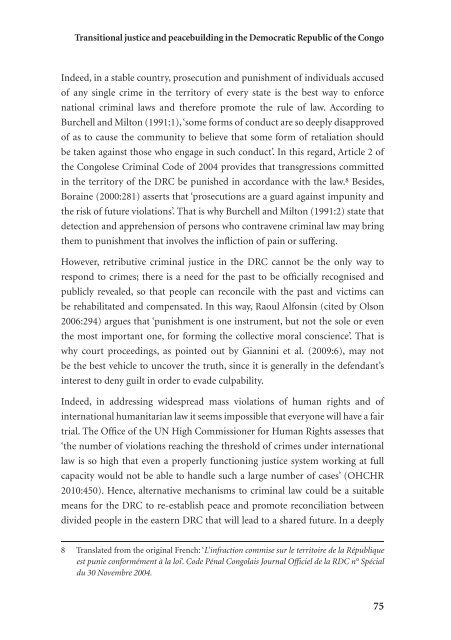ACCORD-ajcr-2015-1
ACCORD-ajcr-2015-1
ACCORD-ajcr-2015-1
- No tags were found...
Create successful ePaper yourself
Turn your PDF publications into a flip-book with our unique Google optimized e-Paper software.
Transitional justice and peacebuilding in the Democratic Republic of the Congo<br />
Indeed, in a stable country, prosecution and punishment of individuals accused<br />
of any single crime in the territory of every state is the best way to enforce<br />
national criminal laws and therefore promote the rule of law. According to<br />
Burchell and Milton (1991:1),‘some forms of conduct are so deeply disapproved<br />
of as to cause the community to believe that some form of retaliation should<br />
be taken against those who engage in such conduct’. In this regard, Article 2 of<br />
the Congolese Criminal Code of 2004 provides that transgressions committed<br />
in the territory of the DRC be punished in accordance with the law. 8 Besides,<br />
Boraine (2000:281) asserts that ‘prosecutions are a guard against impunity and<br />
the risk of future violations’. That is why Burchell and Milton (1991:2) state that<br />
detection and apprehension of persons who contravene criminal law may bring<br />
them to punishment that involves the infliction of pain or suffering.<br />
However, retributive criminal justice in the DRC cannot be the only way to<br />
respond to crimes; there is a need for the past to be officially recognised and<br />
publicly revealed, so that people can reconcile with the past and victims can<br />
be rehabilitated and compensated. In this way, Raoul Alfonsin (cited by Olson<br />
2006:294) argues that ‘punishment is one instrument, but not the sole or even<br />
the most important one, for forming the collective moral conscience’. That is<br />
why court proceedings, as pointed out by Giannini et al. (2009:6), may not<br />
be the best vehicle to uncover the truth, since it is generally in the defendant’s<br />
interest to deny guilt in order to evade culpability.<br />
Indeed, in addressing widespread mass violations of human rights and of<br />
international humanitarian law it seems impossible that everyone will have a fair<br />
trial. The Office of the UN High Commissioner for Human Rights assesses that<br />
‘the number of violations reaching the threshold of crimes under international<br />
law is so high that even a properly functioning justice system working at full<br />
capacity would not be able to handle such a large number of cases’ (OHCHR<br />
2010:450). Hence, alternative mechanisms to criminal law could be a suitable<br />
means for the DRC to re-establish peace and promote reconciliation between<br />
divided people in the eastern DRC that will lead to a shared future. In a deeply<br />
8 Translated from the original French: ‘L’infraction commise sur le territoire de la République<br />
est punie conformément à la loi’. Code Pénal Congolais Journal Officiel de la RDC n° Spécial<br />
du 30 Novembre 2004.<br />
75


